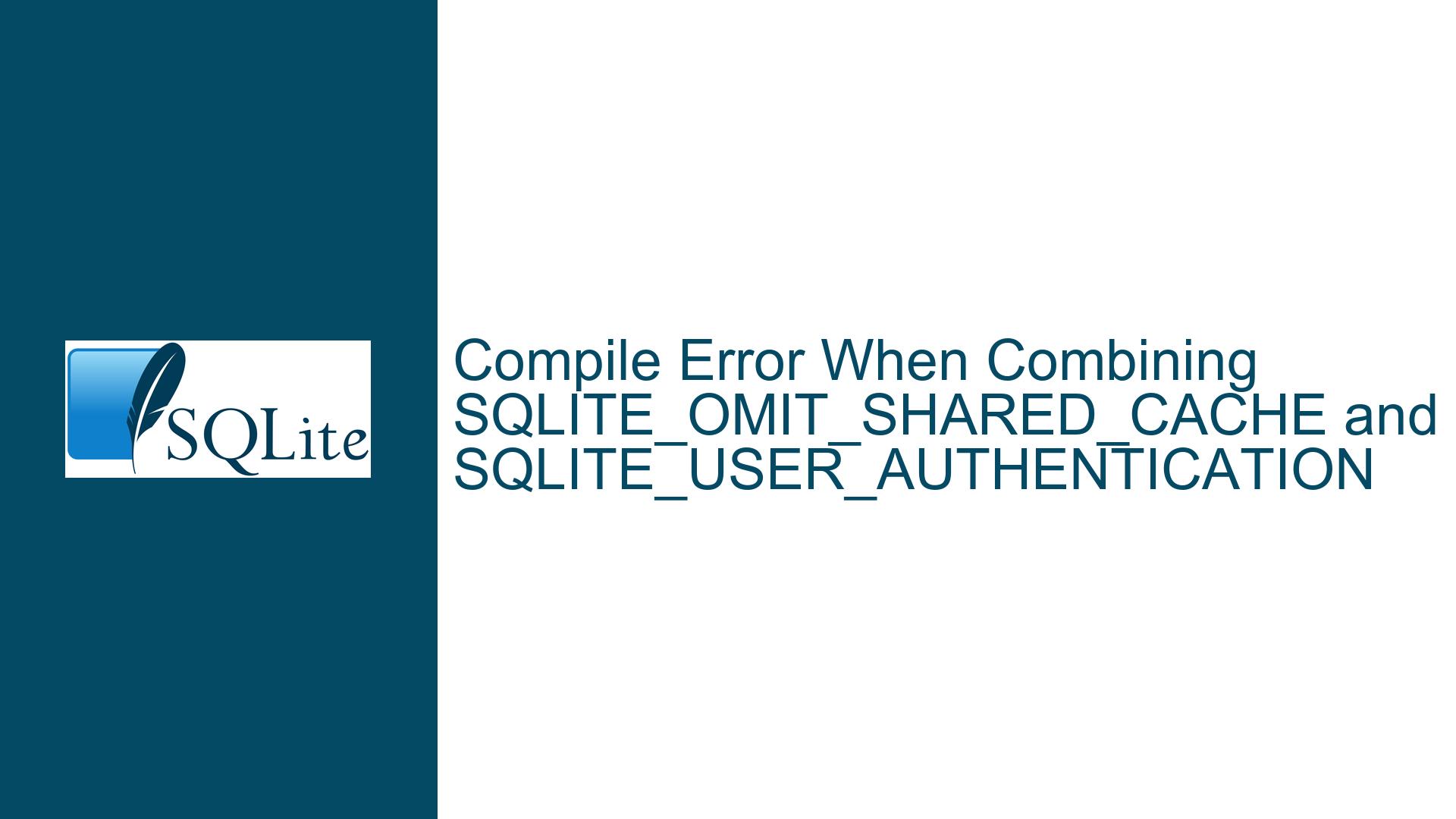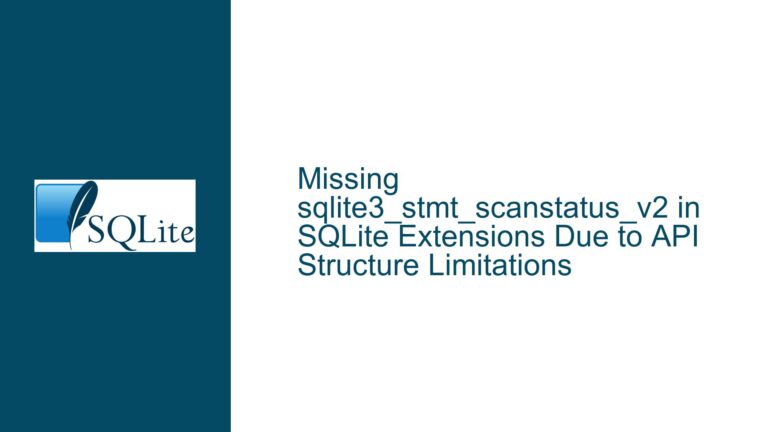Compile Error When Combining SQLITE_OMIT_SHARED_CACHE and SQLITE_USER_AUTHENTICATION
Conflict Between Shared Cache Omission and User Authentication Checks
Structural Dependency on Shared Cache in Authentication Logic
The core issue arises from a structural dependency in SQLite’s codebase where the SQLITE_USER_AUTHENTICATION feature inadvertently relies on the nTableLock member of the Parse structure. This member is conditionally compiled based on the presence of SQLITE_OMIT_SHARED_CACHE. When both SQLITE_OMIT_SHARED_CACHE (which removes shared cache functionality) and SQLITE_USER_AUTHENTICATION=1 (which enables user authentication checks) are defined, the compiler encounters an undefined reference to pParse->nTableLock in sqlite3FinishCoding. This occurs because the nTableLock field is excluded from the Parse struct when shared cache support is omitted, but the user authentication logic still attempts to access it. The conflict highlights a lack of compile-time guards around the authentication code’s dependency on shared cache internals.
The Parse structure in SQLite’s parser module contains metadata about the current SQL statement being processed. When SQLITE_OMIT_SHARED_CACHE is defined, features related to shared cache mode—including table-level locks—are excluded. This exclusion removes the nTableLock counter tracking active table locks. However, the user authentication subsystem introduced via SQLITE_USER_AUTHENTICATION includes a runtime check in sqlite3FinishCoding that references nTableLock to enforce authentication requirements. This check is not properly isolated behind a preprocessor conditional, leading to a compile-time failure when shared cache is omitted. The oversight stems from the implicit assumption that user authentication would only be used in configurations where shared cache is enabled, an assumption not enforced by the build system.
The amalgamation build process complicates this further. While some _OMIT_ flags require building from canonical sources to regenerate parser code, SQLITE_OMIT_SHARED_CACHE does not affect lemon-generated components. This allows the omission of shared cache features in amalgamation builds, but the user authentication code’s dependency on nTableLock creates a latent conflict. The problem persists in both amalgamation and canonical source builds because the conditional compilation guards are missing in the authentication logic itself.
Incompatible Compile-Time Configuration Assumptions
The root cause of the compile error lies in SQLite’s handling of orthogonal compile-time options that were not designed to interact. The SQLITE_OMIT_SHARED_CACHE and SQLITE_USER_AUTHENTICATION flags control independent features, but their combination exposes an undocumented dependency. Shared cache mode involves locking mechanisms that the user authentication subsystem repurposes for security checks, creating an unintended coupling. When shared cache is omitted, the authentication logic attempts to reference a nonexistent struct member because the feature interaction was not accounted for during implementation.
This incompatibility reflects a broader challenge in maintaining conditional compilation paths for complex libraries. SQLite’s extensive set of compile-time options creates a combinatorial explosion of possible configurations, making it difficult to test all permutations. The SQLITE_USER_AUTHENTICATION feature, though not explicitly deprecated at the time of the original report, was later marked as such, which explains why this particular conflict remained unresolved. Developers likely prioritized configurations aligned with recommended settings, where SQLITE_OMIT_SHARED_CACHE is encouraged but SQLITE_USER_AUTHENTICATION is niche.
The error manifests in build.c line 112602 (or equivalent line numbers depending on version), where the authentication check if( pParse->nTableLock>0 && db->init.busy==0 ) executes unconditionally when SQLITE_USER_AUTHENTICATION is enabled. Without shared cache, nTableLock does not exist, violating C’s struct member access rules. This illustrates how feature-specific code can inadvertently rely on components guarded by unrelated preprocessor flags, especially when those features were developed at different times or by different contributors.
Missing Preprocessor Guards in Authentication Code Paths
The immediate technical cause is the absence of #ifndef SQLITE_OMIT_SHARED_CACHE wrappers around the user authentication code that references nTableLock. SQLite’s codebase typically uses nested preprocessor directives to isolate feature-specific code, but this section lacks proper guarding. The correct approach would involve wrapping the authentication check in a conditional that ensures nTableLock is only referenced when shared cache support is compiled in. Without these guards, enabling both flags creates an invalid code path that the compiler cannot resolve.
The proposed fix involves modifying the affected code block in build.c to include a check for SQLITE_OMIT_SHARED_CACHE before evaluating pParse->nTableLock. This aligns with SQLite’s existing pattern of using preprocessor conditions to exclude code dependent on omitted features. The revised code would first check if shared cache is enabled, then proceed with the user authentication logic. This layered approach ensures that nTableLock is only accessed when it exists, eliminating the compile error.
However, implementing this fix requires careful consideration of SQLite’s versioning and the deprecated status of SQLITE_USER_AUTHENTICATION. Later versions of SQLite (post-3.36.0) may have addressed this through deprecation notices or alternative authentication mechanisms. Developers relying on older versions or custom builds must backport the fix or reconsider their use of these compile-time flags. The deprecation of user authentication in favor of newer security models further complicates long-term maintenance for affected configurations.
Compilation Failure Due to Undefined Struct Member in Authentication Check
Interaction Between Omitted Features and Authentication Logic
The nTableLock member of the Parse struct serves as a counter for table locks acquired during statement parsing. When SQLITE_OMIT_SHARED_CACHE is defined, this member is excluded because shared cache mode (and its locking requirements) are disabled. The user authentication subsystem, however, reuses this counter to trigger security checks. Specifically, it verifies that a user is authenticated if any tables were locked during parsing. This design creates a hidden dependency: enabling authentication implicitly requires shared cache functionality, even if the latter is explicitly disabled via SQLITE_OMIT_SHARED_CACHE.
This dependency is not documented or enforced by the build system. Developers combining these flags encounter a compile error because the authentication logic assumes nTableLock exists. The error message explicitly cites the missing struct member, pinpointing the line where the authentication check occurs. This indicates a violation of C’s type system rules, as the code attempts to access a field that was excluded during preprocessing.
The conflict reveals an architectural oversight in SQLite’s modular design. While individual features like shared cache and user authentication are optional, their cross-cutting concerns (e.g., security checks tied to locking) were not fully decoupled. The result is a fragile compile-time dependency that surfaces only in specific configuration combinations. This underscores the importance of testing uncommon flag permutations and using static analysis tools to detect such issues.
Misalignment Between Feature Flags and Code Guarding
SQLite’s use of preprocessor directives to enable/disable features relies on precise guarding of feature-specific code. In this case, the user authentication code block lacks a guard for SQLITE_OMIT_SHARED_CACHE, allowing it to reference a nonexistent struct member. The correct approach would involve wrapping the entire authentication check in a conditional that verifies both SQLITE_USER_AUTHENTICATION is enabled and SQLITE_OMIT_SHARED_CACHE is not enabled. Without this, the code attempts to execute a security check that depends on omitted functionality.
The error occurs because the preprocessor conditions are not properly nested. The existing code guards the authentication check with #if SQLITE_USER_AUTHENTICATION, but does not account for the presence of shared cache features. This single-layer guarding assumes that any configuration enabling user authentication also includes shared cache support—an assumption invalidated by the SQLITE_OMIT_SHARED_CACHE flag. Properly nested directives would prevent the problematic code from being compiled when shared cache is omitted.
The fix proposed by the original poster addresses this by adding an outer #ifndef SQLITE_OMIT_SHARED_CACHE block. This ensures the authentication check only compiles when shared cache is available, avoiding the undefined struct member. Such a fix aligns with SQLite’s existing code organization and would resolve the immediate compile error. However, it raises questions about the broader interaction between authentication and other omitted features, suggesting a need for more comprehensive guard conditions in the codebase.
Impact of Deprecated Features on Configuration Viability
The discussion thread reveals that SQLITE_USER_AUTHENTICATION was later deprecated, as noted in a 2024 comment referencing a code change (SHA-1: 249048b0cbc37058). Deprecation implies that the feature is no longer maintained and may be removed in future versions. For developers encountering this compile error, the deprecation status suggests that relying on SQLITE_USER_AUTHENTICATION is inadvisable, and alternative authentication mechanisms should be considered.
This deprecation complicates the decision to apply the proposed fix. While the code change resolves the immediate issue, investing effort into a deprecated feature may not be sustainable. Developers must weigh the cost of maintaining a patched SQLite version against migrating to newer authentication methods. SQLite’s documentation now recommends against using SQLITE_USER_AUTHENTICATION, steering users toward external security layers or database encryption.
For legacy systems requiring user authentication, the options are limited: either backport the fix to older SQLite versions or disable SQLITE_OMIT_SHARED_CACHE (despite its recommendation). The latter undermines the benefits of omitting shared cache, such as reduced code size and complexity. This trade-off highlights the challenges of maintaining compatibility with deprecated features in highly configurable software.
Resolving Undefined nTableLock Errors in Shared Cache-Omitted Builds
Step 1: Validate Compile-Time Configuration Requirements
Begin by auditing the project’s CFLAGS/CPPFLAGS to confirm that both SQLITE_OMIT_SHARED_CACHE and SQLITE_USER_AUTHENTICATION=1 are explicitly defined. Cross-reference these flags with SQLite’s documentation to ensure they are compatible. Note that SQLITE_USER_AUTHENTICATION is deprecated, and its use is discouraged in favor of newer security practices.
If using the amalgamation build, verify that the flags are applied correctly. Some _OMIT_ flags require building from canonical sources, but SQLITE_OMIT_SHARED_CACHE should work with the amalgamation. Ensure no conflicting flags (e.g., SQLITE_ENABLE_SHARED_CACHE) are present, as these could reintroduce the shared cache code.
Step 2: Apply Conditional Compilation Guards to Authentication Code
Modify the affected code in sqlite3FinishCoding (typically in build.c) to wrap the user authentication check with #ifndef SQLITE_OMIT_SHARED_CACHE. The corrected code block should resemble:
#ifndef SQLITE_OMIT_SHARED_CACHE
#if SQLITE_USER_AUTHENTICATION
if( pParse->nTableLock>0 && db->init.busy==0 ){
sqlite3UserAuthInit(db);
if( db->auth.authLevel<UAUTH_User ){
sqlite3ErrorMsg(pParse, "user not authenticated");
pParse->rc = SQLITE_AUTH_USER;
return;
}
}
#endif
#endif
This ensures the authentication check only compiles when shared cache is enabled, preventing references to nTableLock when it’s omitted. Rebuild SQLite after making this change to confirm the compile error is resolved.
Step 3: Evaluate Alternatives to Deprecated Authentication Features
Given the deprecation of SQLITE_USER_AUTHENTICATION, consider migrating to alternative security mechanisms. SQLite offers encryption extensions like SQLite Encryption Extension (SEE) or third-party solutions such as SQLCipher. These provide robust authentication and encryption without relying on deprecated code paths.
If user authentication is critical and migration isn’t feasible, maintain a patched version of SQLite with the above fix. Document this deviation from upstream and monitor for future conflicts, especially with security updates. Alternatively, disable SQLITE_OMIT_SHARED_CACHE to retain shared cache functionality, accepting the associated overhead.
Step 4: Test Runtime Behavior Post-Fix
After resolving the compile error, conduct thorough testing to ensure the authentication logic behaves as expected. Verify that:
- User authentication prompts occur when accessing locked tables (if shared cache is enabled).
- Omitting shared cache does not introduce security gaps or runtime errors.
- The application handles
SQLITE_AUTH_USERerrors correctly when authentication fails.
Use SQLite’s test suite and custom test cases to validate these scenarios. Pay particular attention to edge cases where tables are accessed without explicit locks, ensuring the absence of nTableLock doesn’t cause silent failures.
Step 5: Monitor SQLite Updates and Community Patches
Subscribe to SQLite’s release notes and security advisories to track changes affecting your configuration. If the deprecated SQLITE_USER_AUTHENTICATION is removed in a future version, plan a migration strategy. Engage with the SQLite community through forums or mailing lists to share your patch and gather feedback on long-term maintainability.
For projects requiring high security, prioritize transitioning to supported authentication methods. Leverage SQLite’s extension system to integrate modern security practices without modifying the core library. This reduces reliance on deprecated features and aligns with SQLite’s development trajectory.






